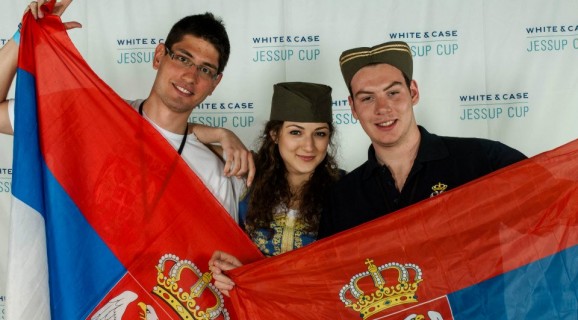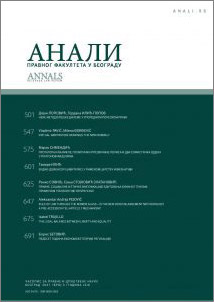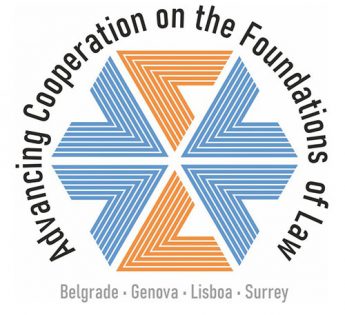
Our students’ continued success at the Moot court competitions
In the period of March 29 – April 6, 2013, a team of University of Belgrade Faculty of Law, comprised of students: Stefan Dragojević, Katarina Grga, Nina Janković and Branislav Radović, and coached by a Fulbright scholar Prof. Paul Carrier, took part in one of the most renowned moot court competitions in the world – the Philip C. Jessup International Moot Court Competition held in Washington, D.C., and returned from the US with excellent results. The written memorials of our students scored 86 out of max. 100 points, and two members of the team, Nina Janković and Branislav Radović, were ranked amongst the 100 top speakers in the international rounds amongst 500 student participants. Such a remarkable results secured our team’s high overall placement – they were ranked 57th in the competition of 575 teams from over 80 different countries. Although our students have in the past participated in the national competition for the Jessup Moot, this was the first time that our Faculty and the University of Belgrade were represented in the international rounds taking place in Washington, D.C.
The Jessup Moot is an advocacy competition for law students. It was named after a U.S. representative for the International Court of Justice in The Hague. It is the largest moot court competition, as well as the oldest with a focus on international law. The Competition requires teams of law students compete against one another through the presentation of oral and written pleadings to address timely issues of public international law in the context of a hypothetical legal dispute between nations. The Compromis is the springboard for the Jessup Competition. Written by leading scholars of international law, the Compromis is a compilation of agreed upon facts about the dispute that is submitted for adjudication to the International Court of Justice (ICJ). After the Compromis is released, students begin researching and preparing arguments for both sides of the dispute, drafting and editing written pleadings, called “Memorials”, and practicing oral presentations. Each team prepares two written memorials and two 45-minute oral presentations, one for each party to the dispute (the “Applicant” and the “Respondent”). Teams argue four times alternately as Applicant and Respondent against competing teams before a panel of judges, simulating a proceeding before the International Court of Justice.
This year’s topic raised an interesting set of issues surrounding the entire submersion of a fictitious island caused by factors including rising water levels due to climate change created by pollution. Interestingly, what was not asked directly was the responsibility of a neighboring country to the island which was a significant polluter. Rather, the questions involved the elements of statehood (and whether loss of all territory removes statehood), issues concerning the treatment of a group of refugees (possibly “environmental refugees” and a proposed transfer to a country with a poor human rights record), and the proper use of funds allocated by one nation to the fictitious island nation after its total submersion.
 The Belgrade team was selected after an interview process and began to work on research of the relevant international laws in late October. Preparations for the Moot require more work to do than many students think. The laws at issue are highly specialized, and also chosen from issues expected to become important in the near future – so that there is no real answer yet for their resolution. As the deadline for submission of the Memorials approached, which was in mid-January, the students began to spend days and nights together researching and writing as a team. The hard work paid off, because the team received great scores for their two Memorials, and they also did such a good job with English, with formatting, and with organization that their Memorials did not receive any penalties.
The Belgrade team was selected after an interview process and began to work on research of the relevant international laws in late October. Preparations for the Moot require more work to do than many students think. The laws at issue are highly specialized, and also chosen from issues expected to become important in the near future – so that there is no real answer yet for their resolution. As the deadline for submission of the Memorials approached, which was in mid-January, the students began to spend days and nights together researching and writing as a team. The hard work paid off, because the team received great scores for their two Memorials, and they also did such a good job with English, with formatting, and with organization that their Memorials did not receive any penalties.
The knowledge gained in the Moot involves not only specialized knowledge of international laws that were involved in this year’s issues but also how much work is required to create a good set of Memorials. The students also improved their oral advocacy skills with the many practice rounds judged by their professors, local experts, and friends as well as several students who have had successes at other competitions. Understanding relevant cases and using them to support an argument is an important skill that the team had to learn because it is such an important part of oral arguments. The team was also required to undertake a significant amount of fund-raising and organizing of practice rounds, securing visas to the U.S.A., and similar behind-the-scenes requirements. From start to finish, the students learned the basics for the successful completion of a major project with many requirements.
During their stay in the United States the students had the opportunity to meet with Serbian representatives in the Serbian Embassy in Washington, with lawyers and business people of Serbian descent living in the U.S.A. These include Honorable Branko Terzić – Executive Director, Deloitte Center for Energy Solutions and Regulatory Policy Leader, Mr. Branko Mikašinović, Journalist and Broadcaster at IBB Voice of America (and their interview with Mr. Mikašinović was broadcast around the world); and Mr. Milan Varadinović – Head of consular section in Serbian Embassy in the United States, whom made their stay in the USA a truly memorable both educational and cultural experience. After the competition ended, the team had the honor to visit the Serbian Mission to the United Nations in New York City.
The trip to the United States and the participation of our students at the Jessup Moot would not have been possible without the generous support of the team’s sponsors to whom the Faculty and the team owe sincere gratitude. The pool of team’s sponsors and supporters includes: Mr. Branko Terzić, Mr. Branko Mikašinović, Mr. Milan Varadinović, Mr. Toma Fila, Mr. Aleksandar Popović, Fulbright Foundation, Foundation of Prince Aleksandar II for education, Telekom Serbia, Belgrade Bar Association, municipalities of Stari Grad and Vračar, and the Secretariat of City of Belgrade for Sport and Youth. Last but not least, the Faculty wishes to thank Prof. Paul Carrier who has invested his time as a Fulbright scholar in Serbia in guiding the Belgrade team throughout the competition – from the selection process, throughout the written stages of the Moot and preparations for the oral phase of the Competition, to its very beginning at the international rounds in Washington D.C.
See our team’s interview for the Voice of America >>




